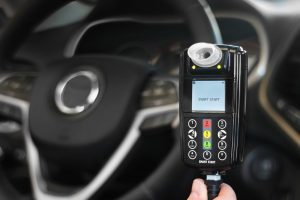 California Ignition Interlock Device Law
California Ignition Interlock Device Law
Yesterday, Governor Jerry Brown signed into law Senate Bill 1046. Starting January 1, 2019, persons who get even first time DUI’s will have to have an ignition interlock device (IID) installed in order to get a restricted driver’s license.
Currently, if you get arrested for a DUI, prior to any conviction, the Department of Motor Vehicles suspends your license for four months. However, you can get a restricted license after 30 days of suspension if you enroll in a first conviction program and have proof of liability insurance (a SR-22 form) on file with the DMV. The restricted license allows you to drive to and from work and to and from the DUI program. There are longer periods if you have multiple DUI’s or if it is a felony.
After a DUI conviction, your license is again suspended and you can get the restricted license again immediately as long as you are in the DUI class and have the SR-22 on file.
The new law that will go into effect January 1, 2019, has already been tested out in four Counties, Alameda, Los Angeles, Sacramento and Tulare. Under the new law, for the first license suspension, instead of waiting 30 days with a license suspension, if a driver gets the ignition interlock (IID) installed, they can avoid the suspension and get a restricted license.
After a DUI conviction, the installation of an ignition interlock device (IID) would be mandatory. It would also be necessary if the driver wanted to get a restricted license again after the re-suspension following conviction. If persons get more than one DUI or if it is a felony DUI, all the periods involved get longer.
What to Know About the New Ignition Interlock Law and IID’s in General
- It costs money to have the ignition interlock device (IID) installed in your vehicle andeven more for the “monitoring” of it.
- This law was lobbied for heavily by the companies that make, install and monitor IID’s and they are going to make millions off of it.
- The news accounts that describe the device as something you have to blow in to start your car are inaccurate. Yes, you do have to blow in it to start your car, but, the machine also requires periodic tests while you are driving. This can be dangerous as it requires you to pull over to safely do a test. It is also worth noting that anyone so hell-bent on drinking a driving that they will start the car and then start drinking are simply going to find a way around the law, like driving someone else’s car.
- It is incredibly embarrassing to have one of these machines in your vehicle. Anyone who rides with you will see you use it. Can you imagine a parent hearing from their kid that the carpool driver has to blow into a machine before their car will start? It ends up being a Scarlet Letter.
- Supporters of the bill cited studies that showed decreases in DUI drivers reoffending and in alcohol related crashes. However, the new law covers EVERYBODY with no discretion for the DMV or a Judge to make an exception.
- People who drive company vehicles will probably lose their job.
- There are serious penalties if you blow into the machine and have alcohol in your system or if you fail to do a test or tamper with the device. Better hope it doesn’t malfunction or your drunk friends don’t screws with it.
How is This Going to Change DUI Cases?
- More people are probably going to want to fight their DUI case through trial because they will not want to be ordered to have the device put in their vehicle. This is going to mean more court time and resources being spent on DUI’s.
- DUI lawyers will be pushing even harder for reduced plea bargains to avoid the orders.
- For people who want to be done with the ignition interlock device (IID) as soon as possible, they may be advised by their lDUI lawyer to have the machine put in as soon as possible. The new law allows for installation even before a suspension is scheduled to go into effect and you get start getting credit towards the period required as soon as it is in your vehicle.
San Diego Defenders (619) 258-8888



